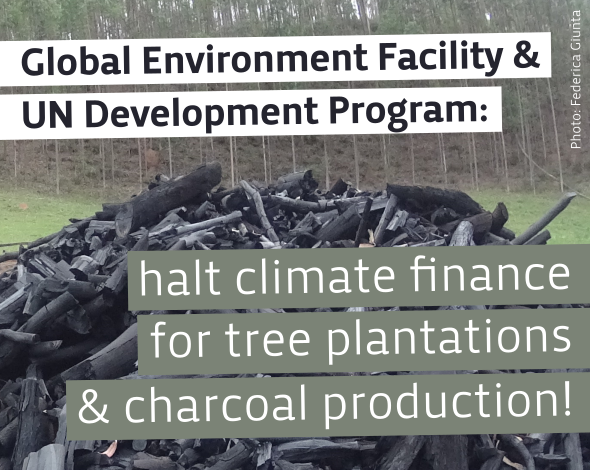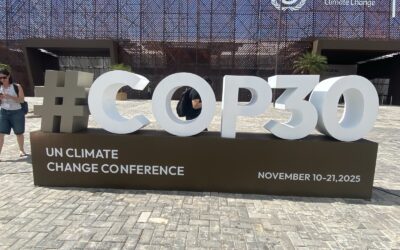As the Global Environment Facility embarks on it’s civil society consultations today ahead of its 59th Council Meeting, we’re publishing an open letter to GEF CEO Carlos Manuel Rodriguez and UNDP Administrator Achim Steiner.
We’re asking them to acknowledge two investigations that reveal how GEF and UNDP money to address climate change is promoting commercial monoculture tree plantations for bioenergy generation. The projects are resulting in harm to communities, biodiversity and the climate, and undermine their mission to tackle the planet’s most pressing environmental problems.
Eucalyptus plantations for charcoal in Brazil and Uganda are drying up water sources and reducing community food security, whilst releasing unnecessary carbon emissions when the trees are turned into charcoal. These emissions are being ignored due to the false claim that wood from plantations is sustainable and renewable.
In Brazil, iron and steel companies with poor track records are being directly subsidised to produce charcoal and, in Uganda, communities are being locked into long-term use of wood for cooking in the home, despite the significant negative health impacts that this has on women and girls.
We’re calling on GEF and UNDP to conduct thorough and independent evaluations of their climate finance projects involving commercial tree plantations and bioenergy generation, and to halt all future finance for such projects.
You can download the case studies here (Brazil | Uganda) and read summary articles on them here (Brazil | Uganda).
Open letter to GEF and UNDP
Dear Carlos Manuel Rodriguez and Achim Steiner,
We are writing to you ahead of the 59th Global Environment Facility (GEF) Council Meeting in order to draw your attention to two recent investigations into GEF-funded and UNDP-implemented climate finance projects in Brazil and Uganda.
These investigations both look at charcoal production using eucalyptus plantations as a climate mitigation strategy, one in Uganda for domestic use and the other in Brazil for use in the iron and steel industry. As you will be able to see from these investigations, in part through poor design and insufficient monitoring, both projects have involved significant negative impacts on communities and biodiversity. They have also made highly questionable emissions reductions claims. Although GEF aims to be a global agent of transformational change through the projects it funds, both of these examples involve locking communities and industry into long-term use of wood for energy generation, with significant negative consequences for women, the climate and communities.
Therefore, we believe that our findings make a strong case for an immediate, thorough and independent evaluation of land-sector GEF and UNDP climate finance projects, and a halt to all future support for projects involving monoculture tree plantations and bioenergy generation. We believe that the recognition of these shortcomings and ensuring that future projects avoid repeating the same mistakes is vital to guaranteeing that GEF’s work is truly transformational, effective and climate friendly.
In particular, we would like to make the following requests:
- Thorough and independent evaluations of the two projects with opportunities for input from civil society, and particularly traditional communities and women’s rights groups given the projects’ lack of impact assessments, and separate to the Mid-Term Review and Terminal Evaluation processes already undertaken by UNDP.
- A broader sectoral evaluation of land-based mitigation projects funded by GEF, particularly involving charcoal production and the use of tree plantations and energy crops for bioenergy generation, with significant and supported civil-society participation.
- Halting all future finance for land-based mitigation projects involving commercial tree plantations and bioenergy generation until such an evaluation has been carried out.
Sincerely,
The Global Forest Coalition




